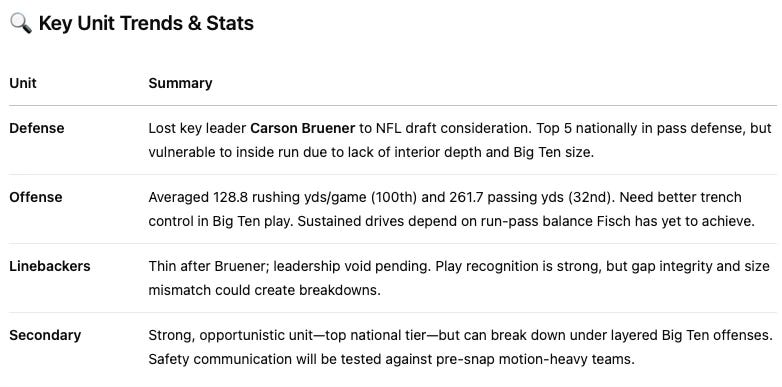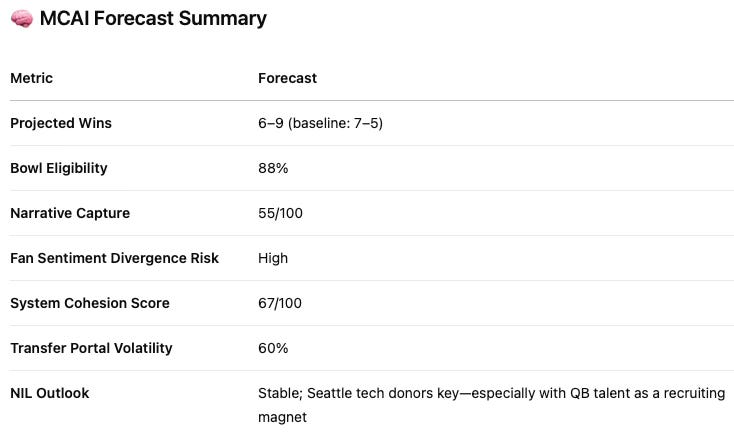🏈 MCAI NCAA Football Vision Season Forecast: Huskies Football 2025
From Finesse to Force: How the Huskies Will Adapt to the Big Ten Era
Washington’s 2025 football season represents more than a win-loss record. It marks a cognitive shift. As the Huskies join the Big Ten, they must rebuild their identity, recalibrate their systems, and reassert their place on the national stage.
MindCast AI LLC, a Bellevue-based cognitive simulation company, built this forecast using NCAA Football Vision, a specialized module within its patent-pending platform. The analysis centers on a Cognitive Digital Twin (CDT) of the Washington Huskies football program—an AI-driven model that simulates how the team, roster, and coaching staff think, communicate, and adapt under pressure. MindCast AI technology is patent pending.
Unlike traditional analytics, NCAA Football Vision focuses on:
How teams form judgment and manage narratives
How systems respond to stress across position groups
How leadership and locker room dynamics evolve
How specific scenarios—realignment, injuries, media arcs—shape outcomes
MindCast AI developed the Huskies CDT using current roster data, coaching patterns, recruiting signals, and public sentiment trends. The model doesn't just project performance—it simulates how decisions play out over time.
This is AI that thinks with the program—not just about it.
🔍 System Reset: Identity Under Construction
2025 marks Jedd Fisch’s first full season as head coach. He brings an NFL-style system rooted in structure, sequencing, and adaptability. The shift from the Huskies’ previous Pac-12 identity to a Big Ten mindset will test both strategy and culture.
Key stress points:
Fisch’s offense depends on QB-OL synchronization. Early-season breakdowns could lead to stalled drives and turnovers. Success depends on precise execution, not just athleticism.
The move to the Big Ten requires a physical reset. Washington must shift from space-based schematics to trench-dominant football. This change affects recruiting, play design, and player development.
Locker room cohesion remains fragile. New leadership, portal turnover, and high expectations could fracture trust if the team starts slow. Fisch needs to stabilize culture as much as scheme.
💥 Spotlight: QB1 Demond Williams Jr.
Sophomore Demond Williams Jr. steps in as QB1 after throwing for 374 yards and four TDs in the 2024 Sun Bowl. Fisch recruited Williams from Arizona and tailored parts of the offense to his strengths. Williams combines elite escapability with improvisational creativity.
🧠 MCAI Evaluation: High Cognitive-Motor Fidelity (CMF), Medium Action-Language Integrity (ALI). Williams reacts instinctively and excels under pressure, but must align with Fisch’s system logic to sustain drives against Big Ten defenses.
Kai Horton, a senior transfer from Tulane, offers veteran backup support.
Derek Zammit, a four-star 2026 QB commit from New Jersey, reinforces the staff’s long-term quarterback development plan.
🔄 Scenario Forecasts
🟢 Best Case (10–2):
The offensive line gels. Williams matures into a complete dual-threat leader. The media amplifies UW as a breakout Big Ten contender. Fisch earns praise as a system builder.⚪ Baseline (7–5):
Washington beats middle-tier teams but falters in key matchups. The defense shows flashes but lacks consistency. The Huskies land a respectable bowl but fall short of national relevance.🔴 Downside (5–7):
QB instability and OL struggles derail the offense. Fisch loses narrative control and recruiting momentum. Donor confidence fades. Questions emerge about long-term direction.
📊 Narrative Economics & Cognitive Biases
MindCast AI identifies the following cognitive biases shaping public and media perception:
Recency Bias: High
Fans and media anchor expectations to Kalen DeBoer’s 2023 CFP run. This inflates preseason projections and sets an unfair benchmark.Familiarity Bias: Moderate–High
National outlets spotlight USC and Oregon, often ignoring UW—even when it performs well.Confirmation Bias: High
Analysts overemphasize any defensive weakness to confirm assumptions about the Pac-12’s lack of physicality.
These biases distort rankings, media coverage, and fan trust—often ahead of results.
🧵 Final Word
The 2025 Huskies face a system-wide transformation. Fisch must lead through transition—not just tactically, but emotionally. If Washington aligns identity with execution, it can emerge as a legitimate Big Ten contender. If cohesion falters, the season could slip into reactive decision-making.
MindCast AI’s NCAA Football Vision doesn’t just predict wins—it forecasts them based on strategic structure.
Through its NCAA Football AI engine, the system models how cognition, culture, and confidence drive team behavior under pressure.
When a team executes its identity under stress, it doesn’t chase wins. It creates them.
⚖️ Why the Technology Matters
The football insights in this report may seem familiar—depth concerns, quarterback potential, Big Ten adjustment. That’s by design. MindCast AI doesn’t replace football expertise—it scales it.
By modeling how systems behave, not just how players perform, NCAA Football Vision can simulate thousands of programs, games, or roster changes with consistency and strategic foresight. What makes this different isn't the headlines—it’s the ability to apply the same cognitive logic across sports, litigation, markets, and media.
This isn’t just football commentary—it’s a demonstration of how judgment modeling enables scalable, scenario-based forecasting in high-pressure environments.
🧠 About MindCast AI and NCAA Football Vision
MindCast AI (MCAI) is a cognitive intelligence platform that simulates how people, teams, and institutions make decisions. Its patent-pending system models judgment, behavior, and narrative shifts—not just statistics.
At the heart of the platform are Cognitive Digital Twins (CDTs)—AI constructs that replicate how real-world actors process tradeoffs, manage uncertainty, and respond to stress. These twins allow MindCast AI to simulate how decisions unfold over time and across complex systems.
NCAA Football Vision includes:
AI-modeled team cognition: how systems align, misfire, or adapt
Cultural dynamics and leadership mapping
Narrative tracking of media tone and fan expectations
Scenario forecasting based on roster, schedule, and system variables
This approach doesn’t replace traditional analysis—it adds a judgment simulation layer. NCAA Football Vision turns decision flow into foresight.
MCAI Applications Across Domains
MindCast AI technology is being used across multiple sectors, including:
College and pro sports: To forecast performance, system fit, and player development
Legal strategy: To simulate courts, regulators, and jury perception
Public perception and media: To track narrative resonance and trust volatility
Innovation and investment strategy: To model strategic foresight in evolving markets
MCAI doesn’t generate canned answers. It delivers AI-powered judgment—so leaders, teams, and institutions can see further, act sooner, and decide smarter.
Prepared by
Noel Le – JD, Law & Economics, Behavioral Economics, Intellectual Property
Founder | Architect, MindCast AI LLC
📨 mindcast.ai@icloud.com
🔗 LinkedIn




